Today, online reviews have become powerful tools that can greatly impact the output of business sales.
A good review can bolster sales by inviting new consumers to purchase services and goods, whereas a bad review could hinder the sales and revenue of a business.
Artificial intelligence is increasingly popular today and is now being used for everyday tasks, even writing reviews, which is impacting a number of industries, including lawn care and landscaping.
This study analyzes lawn care and landscaping reviews across 10 US cities using the Originality.ai AI detector to understand the impact and prevalence of AI-generated reviews.
By analyzing review data from 100 businesses across 10 US cities, we aim to understand how generative AI is influencing consumer perception in this traditionally hands-on, service-based industry.
Our investigation is shaped by the following research questions:
Through these questions, the study offers insight into how artificial intelligence is reshaping consumer trust, marketing strategies, and authenticity in the Lawn Care and Landscaping industry, an industry where credibility and community reputation are key.
This poses concerns for customers looking to book a lawn care or landscaping service — is the review they’re reading real and accurate, or generated and fake?

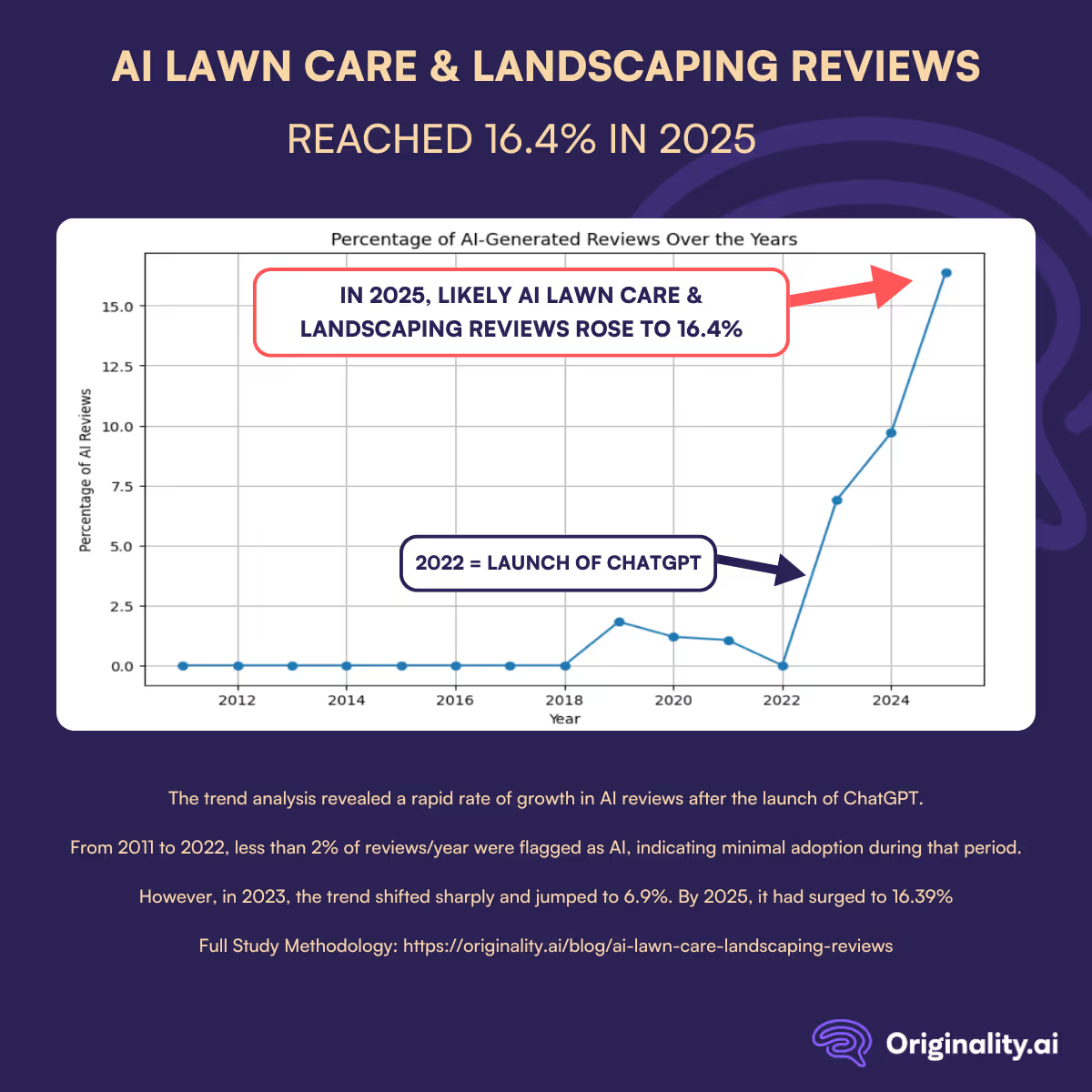
Although AI-generated reviews in the Lawn Care and Landscaping sector were virtually nonexistent until recently, the landscape shifted dramatically starting in 2023.
From 2011 through 2022, fewer than 2% of reviews each year were flagged as AI-written.
Considering that ChatGPT wasn’t launched until 2022, at which time it rapidly rose in popularity, the low levels of AI reviews from the beginning of the study period are in line with minimal AI adoption during that time.
However, in 2023, the trend shifted sharply and jumped to 6.9% (rounded from 6.89%).
This surge aligns closely with the public release dates of popular LLM tools like ChatGPT (2022) and marks a pivotal point in AI accessibility and application.
The growth did not stop there, and the momentum continued in 2024, where 9.6% of reviews were classified as likely AI-generated, and by 2025, it had surged to 16.39%.
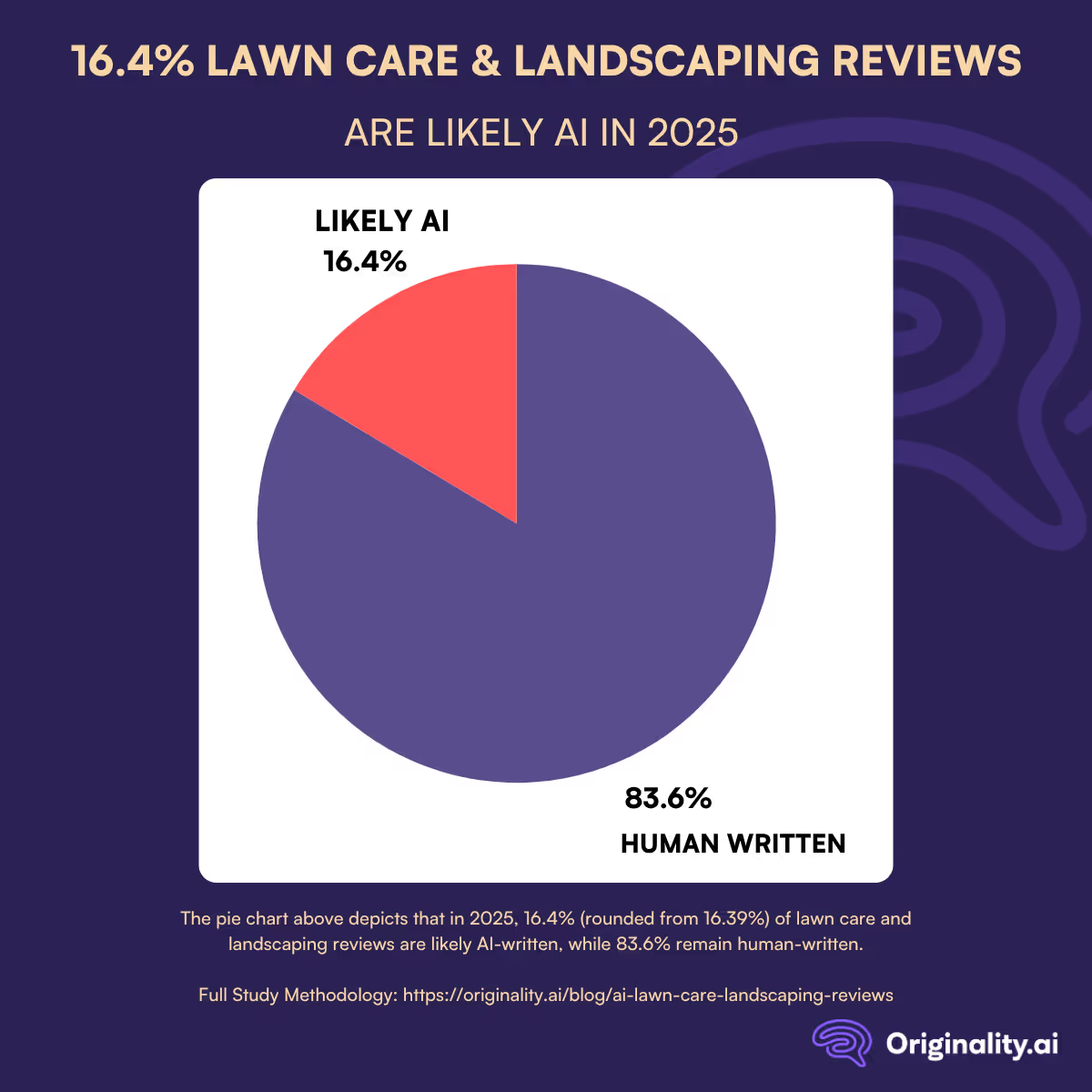
That means that in 2025, with 16.4% of reviews classified as AI-generated (rounded from 16.39%), just under 1 in 5 reviews are now AI-generated.
The rapid growth suggests that AI is not only becoming more accessible to people but may also be being used as a tool by businesses to boost their sales and manage their reputation.
Across all of the reviews studied, the majority, at 95.14% were human-written. That means 4.86% of the total dataset was classified as likely AI-generated.
At first glance, 4.86% may appear modest; however, it spans the entire dataset (including years when AI adoption was minimal).
So, a deeper dive reveals a significant shift in how even the most traditionally offline industries like lawn care and landscaping are now utilizing AI technology, with AI review levels significantly higher in 2023 to 2025, following ChatGPT’s launch.
It will be interesting to see how the overall level of AI reviews changes in the lawn care and landscaping industry amid the rapidly evolving AI landscape.
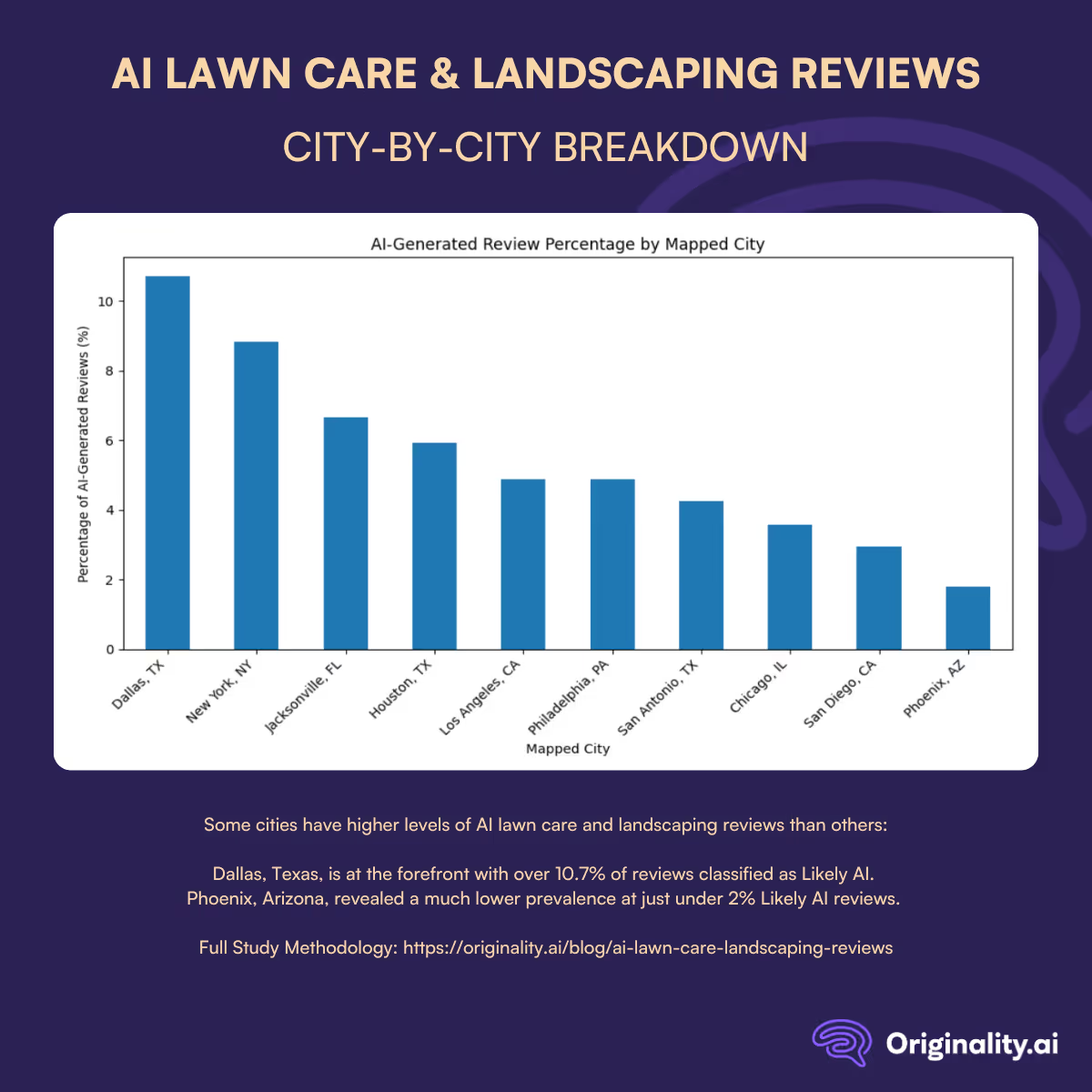
The adoption of AI-generated reviews isn’t consistent across the board. Some cities have higher levels of AI lawn care and landscaping reviews than others:
This indicates that the adoption of AI in reviews is not uniform across US cities, and some regions are more likely than others to utilize AI-written reviews.
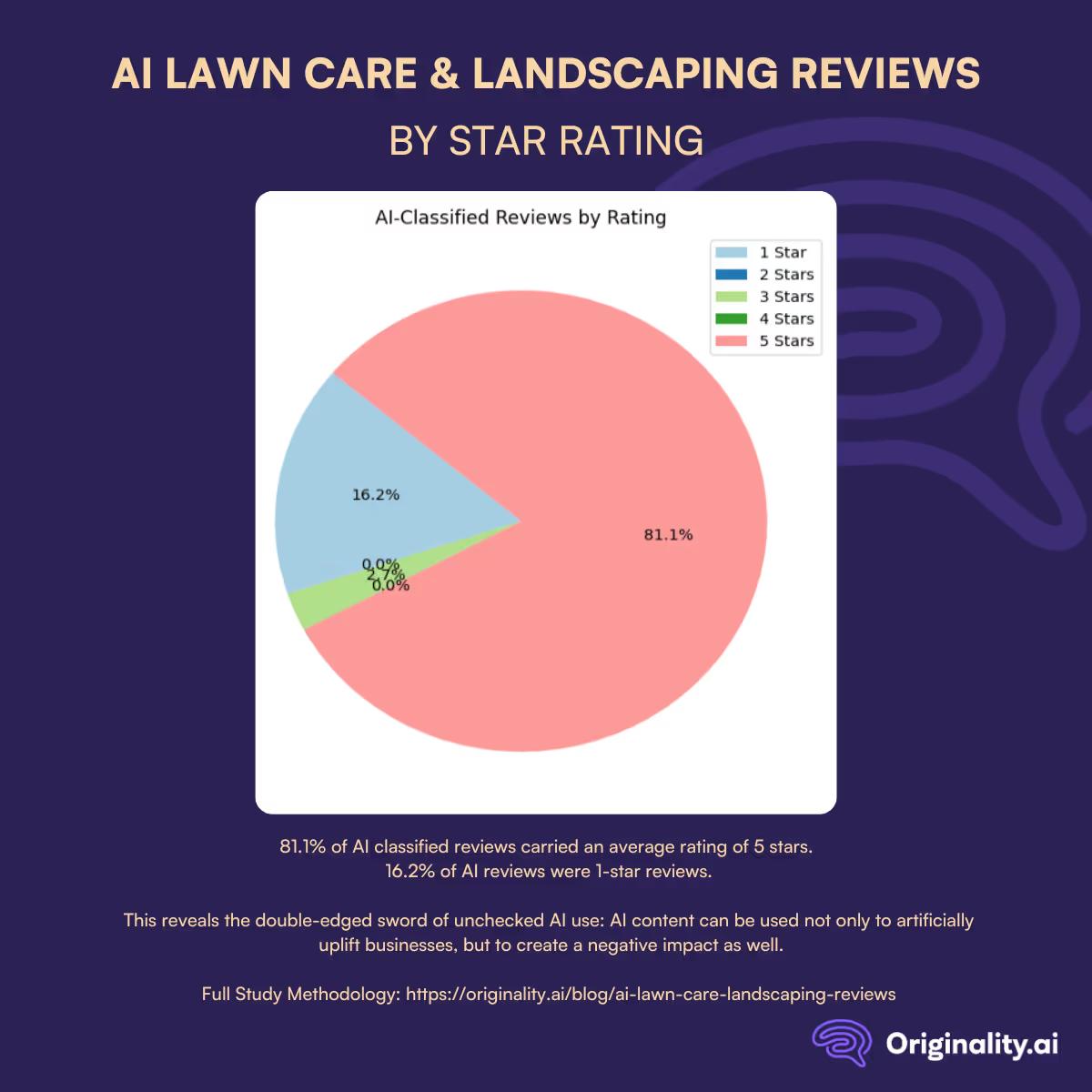
Another key insight from this analysis is the distribution of star ratings across AI reviews.
We found that 81.1% of AI classified reviews were positive and carried an average rating of 5 stars (as illustrated in the pie chart).
This could indicate that AI-classified review content was generated to positively boost business reputation and bolster the company’s online image.
The data also revealed another trend: 16.2% of AI-generated reviews were 1-star reviews.
On the flip side, this raises concerns that AI could be used to generate negative feedback for businesses that may not reflect actual customer sentiment.
Fake negative reviews can damage business credibility and lead to lost sales or trust, especially in a service industry like lawn care and landscaping, where every review counts.
This reveals the double-edged sword of unchecked AI use: AI-generated content can be used not only to artificially uplift businesses but to create a negative impact as well.
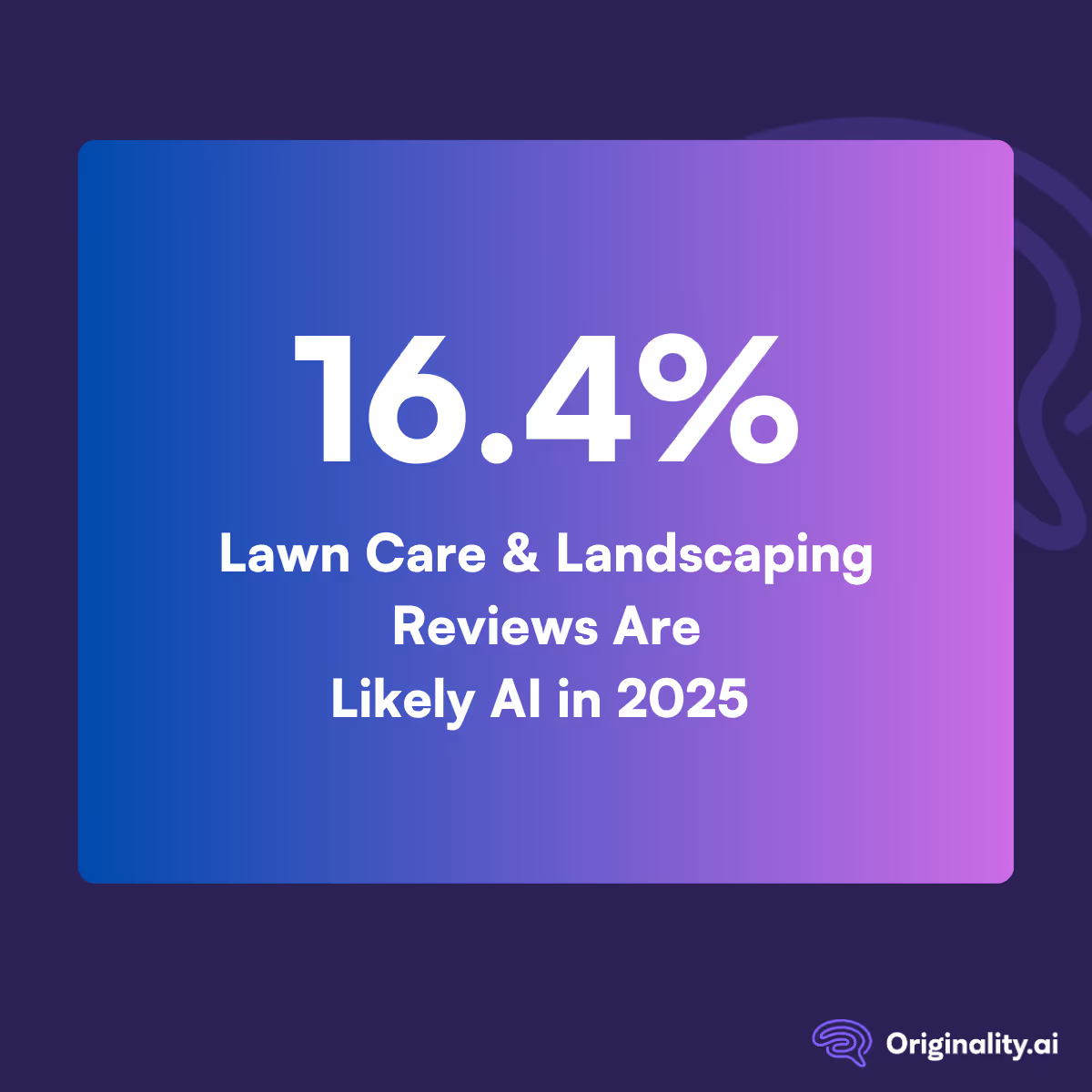
The growing presence of AI-generated feedback in the Lawn Care and Landscaping Industry, an industry where trust is vital, introduces major concerns.
On one hand, businesses may use AI for purposes such as reputation management, maintaining consistency in messaging, or responding to customers' interactions in a quick manner.
However, without moderations in place, businesses or competitors may use AI negatively and create falsely generated reviews that can mislead consumers, create unfair competitive advantages, and decrease the overall integrity of online feedback.
Customers rely on reviews to make informed decisions. When those reviews are no longer a reflection of actual experiences, the integrity of online feedback is at great risk.
Over time, this could erode trust not only in specific businesses but also in the validity of online reviews altogether. In short, while AI-generated content may help businesses stand out temporarily, it risks misleading consumers unless clearly disclosed and regulated.
The Lawn Care and Landscaping industry may not be the first sector that comes to mind when thinking about AI disruption.
However, the data tells us a different story. This industry is not only seeing a rise in AI-generated reviews but is also actively shaping how businesses now present themselves.
The findings call for immediate attention to transparency, regulation, and authenticity review.
As AI continues to encroach on digital spaces, it’s essential that businesses and platforms commit to ethical standards, invest in detection tools, and work toward preserving the credibility of online reviews.
Wondering whether a post or review you’re reading might be AI-generated? Use the Originality.ai AI detector to find out.
Read more about the impact of AI:
Data was sourced using a local business API on RapidAPI, which pulls information from Google Maps via unique business IDs.
The study focused on Lawn Care and Landscaping businesses in 10 major U.S. cities, resulting in data from 100 businesses.
After cleaning the data, reviews with 100+ words were retained, yielding over 700 reviews for analysis.
Note: The quantity of reviews available for the earlier years of this study (2011 to 2017) was low. As a result, the majority of the dataset was gathered for the years 2018 to 2025.
The filtered reviews were analyzed using the Originality.aiI API, which provided two metrics:
Each review included metadata such as business name, city, average rating, review content, review rating, AI classification, and confidence scores — used for further analysis in the study.

Is that LinkedIn post you’re reading real or Likely AI? We ran an updated 2025 dataset to find out! Plus, we took an in-depth look at how Likely AI vs. human-written content impacts engagement. These are our research findings.